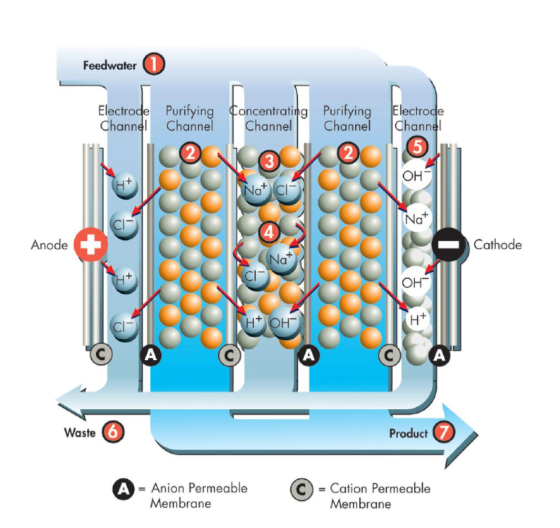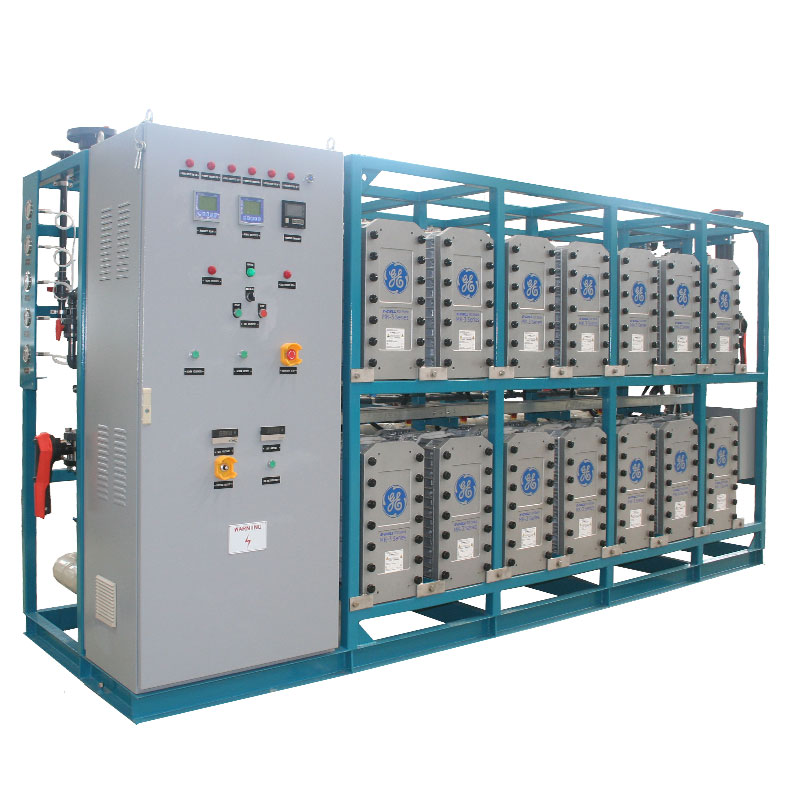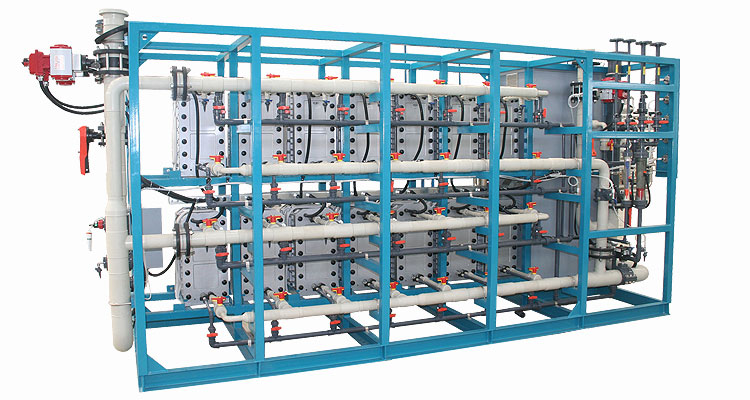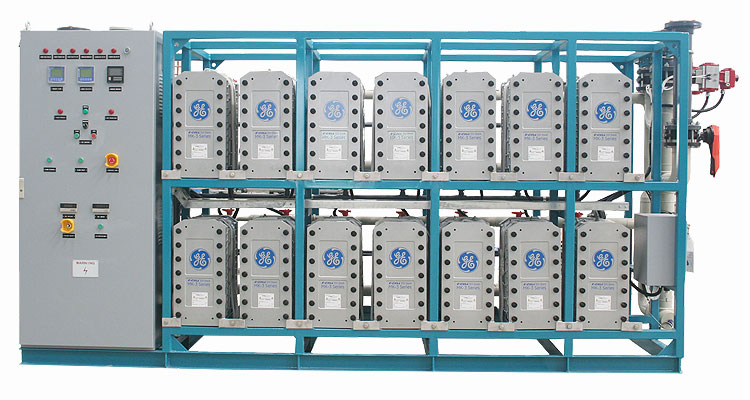What is a deionized water filtration system? How does it work?
A deionized water filtration system is a device used to produce high-purity water, which is widely used in laboratories, electronic manufacturing, pharmaceutical production, food processing and other fields. This system removes ionic impurities from water to make the water reach an extremely high purity level to meet specific industrial or scientific research needs.
This article will introduce the definition, working principle, components and application areas of deionized water filtration systems in detail.

What is a deionized water filtration system?
A deionized water filtration system is a device specially designed to remove ions from water. The deionization (DI) process is to replace cations (such as sodium, calcium, magnesium, etc.) and anions (such as chloride, sulfate, carbonate, etc.) in water with hydrogen ions (H⁺) and hydroxide ions (OH⁻) through ion exchange technology, thereby generating high-purity deionized water. This water has extremely low conductivity and contains almost no dissolved ions, which is suitable for applications with extremely high water quality requirements.
How does a deionized water filtration system work?
The core technology of the deionized water filtration system is ion exchange. Ion exchange is a chemical process based on the mutual replacement of ions. It removes ions from water through specific ion exchange resins. Its working principle can be divided into three steps: ion exchange resin, ion exchange process, and regeneration process. The details are as follows:
1. Ion exchange resin:
The ion exchange resins used in deionized water filtration systems are divided into cation exchange resins and anion exchange resins. Cation exchange resins carry negatively charged groups (such as sulfonic acid groups -SO₃⁻) and can adsorb cations in water; anion exchange resins carry positively charged groups (such as amine groups -NH₃⁺) and can adsorb anions in water.
2. Ion exchange process:
When raw water passes through cation exchange resins, cations in the water (such as Na⁺, Ca²⁺) are exchanged with hydrogen ions (H⁺) on the resin, adsorbed on the resin, and hydrogen ions are released at the same time. Then, the water continues to pass through the anion exchange resin, and the anions in the water (such as Cl⁻, SO₄²⁻) are exchanged with the hydroxide ions (OH⁻) on the resin, adsorbed on the resin, and the hydroxide ions are released at the same time. Finally, the hydrogen ions and hydroxide ions combine to form water molecules (H₂O), thereby obtaining deionized water.
3. Regeneration process:
After a period of use, the ion exchange resin will be saturated and ineffective, and regeneration treatment is required. The regeneration process is to use a high concentration of regeneration liquid (such as acid or alkali) to replace the ions on the resin to restore the original exchange capacity of the resin. Cation exchange resins are usually regenerated with acid (such as HCl), while anion exchange resins are regenerated with alkaline solutions (such as NaOH).

What are the components of a deionized water filtration system?
A complete deionized water filtration system usually includes a pretreatment device, an ion exchange column, a control system, a regeneration device, and a water storage tank. The specific introduction is as follows:
1. Pretreatment device:
The purpose of the pretreatment device is to remove large suspended particles, colloids, organic matter and some ions in the raw water, protect the subsequent ion exchange resin, and improve the working efficiency and life of the system. Pretreatment devices usually include sand filters, carbon filters and softeners.
2. Ion exchange column:
The ion exchange column is the core component of the deionized water filtration system, which is filled with ion exchange resin. According to needs, multiple ion exchange columns can be set up, respectively filled with cation exchange resin and anion exchange resin to achieve a continuous ion exchange process.
3. Control system:
The control system is used to automatically manage the entire deionized water filtration process, including water flow control, resin regeneration control, operation status monitoring and alarm functions. Modern deionized water filtration systems are usually equipped with PLC controllers or DCS systems to achieve fully automatic operation.
4. Regeneration device:
The regeneration device includes an acid tank, an alkali tank, a regeneration pump and related pipelines, which are used to regularly transport regeneration liquid to the ion exchange column to restore the ion exchange capacity of the resin.
5. Water storage tank:
Deionized water is treated and stored in a water storage tank for use. The water storage tank is usually made of high-purity materials to prevent secondary pollution.

What are the application areas of deionized water filtration systems?
Deionized water filtration systems are widely used in laboratories, electronic manufacturing, pharmaceutical production, and food processing because they can produce high-purity water.
1. Laboratory: Laboratories have extremely high requirements for water quality, especially in the fields of chemical analysis, biological experiments, and physical experiments. Deionized water can avoid the interference of impurities in the water on the experimental results and ensure the accuracy and reliability of the experiment.
2. Electronic manufacturing: The electronic manufacturing industry requires ultrapure water for cleaning and processing of high-precision components such as semiconductors and liquid crystal displays. Deionized water filtration systems can provide high-purity water that meets the requirements to ensure product quality and the stability of the production process.
3. Pharmaceutical production: In the pharmaceutical production process, especially in injections, infusions, and drug synthesis, high-purity deionized water is required to avoid the impact of ions and impurities in the water on the quality and safety of drugs.
4. Food processing: In the food processing industry, deionized water is used for food ingredients, beverage production and equipment cleaning. It can effectively remove impurities in water and ensure the hygiene and quality of food.

What are the advantages of deionized water filtration systems?
Compared with other water treatment technologies, deionized water filtration systems have the advantages of high purity, continuous supply, low cost and environmental protection.
1. High purity: Deionized water filtration systems can effectively remove ionic impurities in water and produce high-purity water with extremely low conductivity, which is suitable for applications with extremely high water quality requirements.
2. Continuous supply: Through automatic control and regular regeneration, deionized water filtration systems can achieve efficient and continuous deionized water supply to meet the needs of different applications.
3. Low cost: Compared with other high-purity water preparation technologies such as distillation, the operating cost of deionized water filtration systems is relatively low, mainly in terms of energy consumption and maintenance costs.
4. Environmental protection: The deionized water filtration system does not produce pollutants such as waste gas and waste residue. Only a small amount of waste acid and waste alkali liquid will be produced during the regeneration process. After proper treatment, it can be discharged in compliance with the standards and has little impact on the environment.
Conclusion on the deionized water filtration system
The deionized water filtration system is an efficient and reliable water treatment equipment that can produce high-purity deionized water through ion exchange technology. It is widely used in laboratories, electronic manufacturing, pharmaceutical production and food processing.
Understanding the working principle, components and application areas of the deionized water filtration system will help to better select and use this advanced water treatment technology to ensure water quality safety and efficient use of resources.






